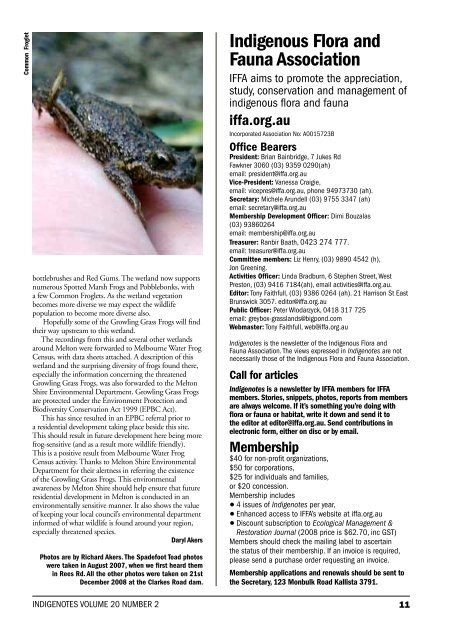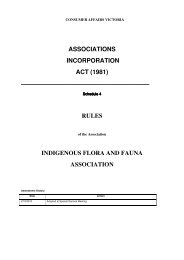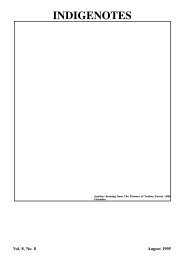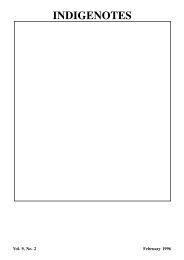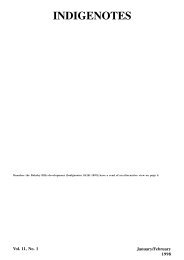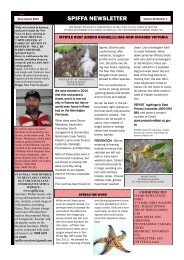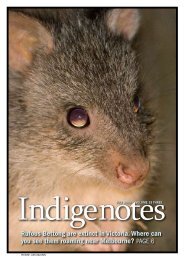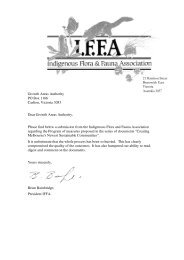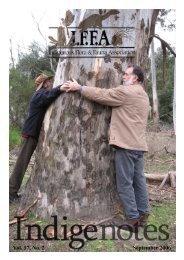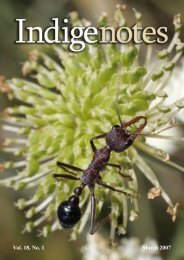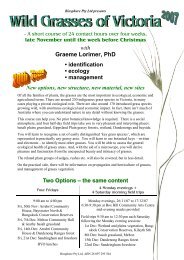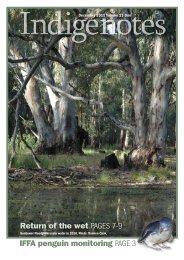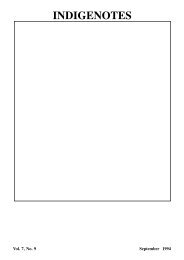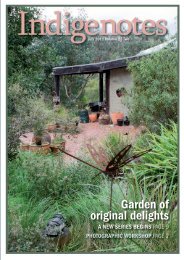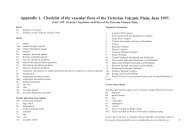July 2009 Volume 20 Two - Indigenous Flora and Fauna Association
July 2009 Volume 20 Two - Indigenous Flora and Fauna Association
July 2009 Volume 20 Two - Indigenous Flora and Fauna Association
Create successful ePaper yourself
Turn your PDF publications into a flip-book with our unique Google optimized e-Paper software.
Common Froglet<br />
bottlebrushes <strong>and</strong> Red Gums. The wetl<strong>and</strong> now supports<br />
numerous Spotted Marsh Frogs <strong>and</strong> Pobblebonks, with<br />
a few Common Froglets. As the wetl<strong>and</strong> vegetation<br />
becomes more diverse we may expect the wildlife<br />
population to become more diverse also.<br />
Hopefully some of the Growling Grass Frogs will find<br />
their way upstream to this wetl<strong>and</strong>.<br />
The recordings from this <strong>and</strong> several other wetl<strong>and</strong>s<br />
around Melton were forwarded to Melbourne Water Frog<br />
Census, with data sheets attached. A description of this<br />
wetl<strong>and</strong> <strong>and</strong> the surprising diversity of frogs found there,<br />
especially the information concerning the threatened<br />
Growling Grass Frogs, was also forwarded to the Melton<br />
Shire Environmental Department. Growling Grass Frogs<br />
are protected under the Environment Protection <strong>and</strong><br />
Biodiversity Conservation Act 1999 (EPBC Act).<br />
This has since resulted in an EPBC referral prior to<br />
a residential development taking place beside this site.<br />
This should result in future development here being more<br />
frog-sensitive (<strong>and</strong> as a result more wildlife friendly).<br />
This is a positive result from Melbourne Water Frog<br />
Census activity. Thanks to Melton Shire Environmental<br />
Department for their alertness in referring the existence<br />
of the Growling Grass Frogs. This environmental<br />
awareness by Melton Shire should help ensure that future<br />
residential development in Melton is conducted in an<br />
environmentally sensitive manner. It also shows the value<br />
of keeping your local council’s environmental department<br />
informed of what wildlife is found around your region,<br />
especially threatened species.<br />
Daryl Akers<br />
Photos are by Richard Akers. The Spadefoot Toad photos<br />
were taken in August <strong>20</strong>07, when we first heard them<br />
in Rees Rd. All the other photos were taken on 21st<br />
December <strong>20</strong>08 at the Clarkes Road dam.<br />
INDIGENOTES VOLUME <strong>20</strong> NUMBER 2<br />
<strong>Indigenous</strong> <strong>Flora</strong> <strong>and</strong><br />
<strong>Fauna</strong> <strong>Association</strong><br />
IFFA aims to promote the appreciation,<br />
study, conservation <strong>and</strong> management of<br />
indigenous flora <strong>and</strong> fauna<br />
iffa.org.au<br />
Incorporated <strong>Association</strong> No: A0015723B<br />
Office Bearers<br />
President: Brian Bainbridge, 7 Jukes Rd<br />
Fawkner 3060 (03) 9359 0290(ah)<br />
email: president@iffa.org.au<br />
Vice-President: Vanessa Craigie,<br />
email: vicepres@iffa.org.au, phone 94973730 (ah).<br />
Secretary: Michele Arundell (03) 9755 3347 (ah)<br />
email: secretary@iffa.org.au<br />
Membership Development Officer: Dimi Bouzalas<br />
(03) 93860264<br />
email: membership@iffa.org.au<br />
Treasurer: Ranbir Baath, 0423 274 777.<br />
email: treasurer@iffa.org.au<br />
Committee members: Liz Henry, (03) 9890 4542 (h),<br />
Jon Greening.<br />
Activities Officer: Linda Bradburn, 6 Stephen Street, West<br />
Preston, (03) 9416 7184(ah), email activities@iffa.org.au.<br />
Editor: Tony Faithfull, (03) 9386 0264 (ah). 21 Harrison St East<br />
Brunswick 3057. editor@iffa.org.au<br />
Public Officer: Peter Wlodarzyck, 0418 317 725<br />
email: greybox-grassl<strong>and</strong>s@bigpond.com<br />
Webmaster: Tony Faithfull, web@iffa.org.au<br />
Indigenotes is the newsletter of the <strong>Indigenous</strong> <strong>Flora</strong> <strong>and</strong><br />
<strong>Fauna</strong> <strong>Association</strong>. The views expressed in Indigenotes are not<br />
necessarily those of the <strong>Indigenous</strong> <strong>Flora</strong> <strong>and</strong> <strong>Fauna</strong> <strong>Association</strong>.<br />
Call for articles<br />
Indigenotes is a newsletter by IFFA members for IFFA<br />
members. Stories, snippets, photos, reports from members<br />
are always welcome. If it’s something you’re doing with<br />
flora or fauna or habitat, write it down <strong>and</strong> send it to<br />
the editor at editor@iffa.org.au. Send contributions in<br />
electronic form, either on disc or by email.<br />
Membership<br />
$40 for non-profit organizations,<br />
$50 for corporations,<br />
$25 for individuals <strong>and</strong> families,<br />
or $<strong>20</strong> concession.<br />
Membership includes<br />
4 issues of Indigenotes per year,<br />
• Enhanced access to IFFA’s website at iffa.org.au<br />
• Discount subscription to Ecological Management &<br />
Restoration Journal (<strong>20</strong>08 price is $62.70, inc GST)<br />
Members should check the mailing label to ascertain<br />
the status of their membership. If an invoice is required,<br />
please send a purchase order requesting an invoice.<br />
Membership applications <strong>and</strong> renewals should be sent to<br />
the Secretary, 123 Monbulk Road Kallista 3791.<br />
11


